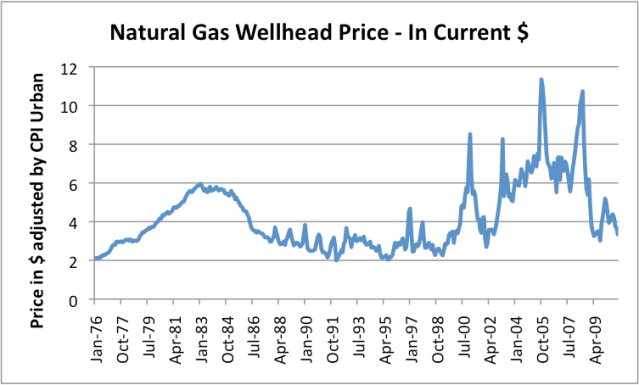 Natural gas has been pitched as a "bridge fuel" by those who don't want to transition New England's electricity supply from dirty fossil fuels like coal and oil to clean energy sources like solar and wind right away.
Natural gas has been pitched as a "bridge fuel" by those who don't want to transition New England's electricity supply from dirty fossil fuels like coal and oil to clean energy sources like solar and wind right away.But the toll on the natural gas "bridge" has suddenly gone way up. That's not surprising since, as the chart shows, natural gas has always been subject to wild price swings. With New England now more dependent on natural gas than ever, supply has struggled to keep up with demand. As the New York Times' Matthew Wald reports, that's sent New England electricity prices spiking sharply this winter:
The six-state New England region and parts of Long Island are the most vulnerable now to overreliance on gas, a vulnerability heightened by a shortage of natural gas pipeline capacity, but officials worry that similar problems could spread to the Midwest.But natural gas companies aren't interested in selling it to New England at a discount. They want to export it to get top dollar on the international market:
“We are sticking a lot of straws into this soft drink,” said William P. Short III, an energy consultant whose clients include companies that move and burn gas. “This is a harbinger of things to come in New England, as well as New York.”
Several companies want to liquefy and export gas from the continental United States because of the shale gas glut, and the events in New England could affect that debate. Opposition has come mostly from domestic industries that use the gas. A spokesman for Senator Ron Wyden, Democrat of Oregon and chairman of the Senate Committee on Energy and Natural Resources, said Mr. Wyden saw the price gyrations in New England as a reason to “look before we leap ahead with unfettered exports of gas.”The natural gas price spike shows that while natural gas may be cleaner burning and at times cheaper than coal, it's still a bad idea to put all our eggs in one fossil fuel basket. The more we can diversify our energy sources with modern, clean energy sources, the more insulated we'll be from price spikes. (Plus there are plenty of questions about the health and water impacts of natural gas fracking.)
Today, there's not one offshore wind turbine harvesting wind energy off the Atlantic Coast. Not one! Wind may cost a little more to build up front, but Mother Nature isn't going to threaten to export our breezes to Europe unless we pay exorbitant prices.
It's been 12 years since Cape Wind was first proposed and our regulators have let big mansion money on the Cape tie it up in regulatory knots. Let's build Cape Wind now - and a lot more offshore wind to follow.
Chart via Our Finite World

No comments:
Post a Comment